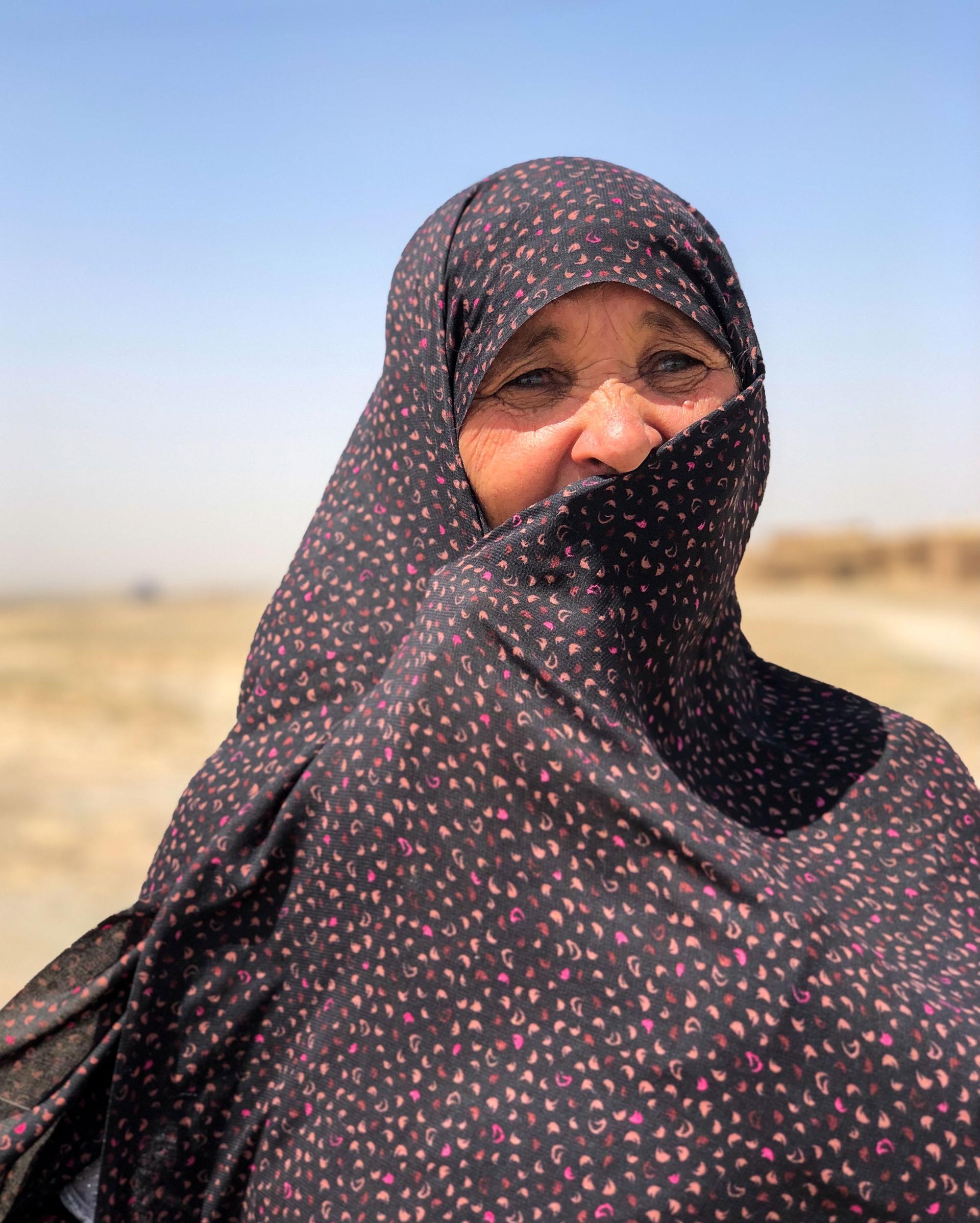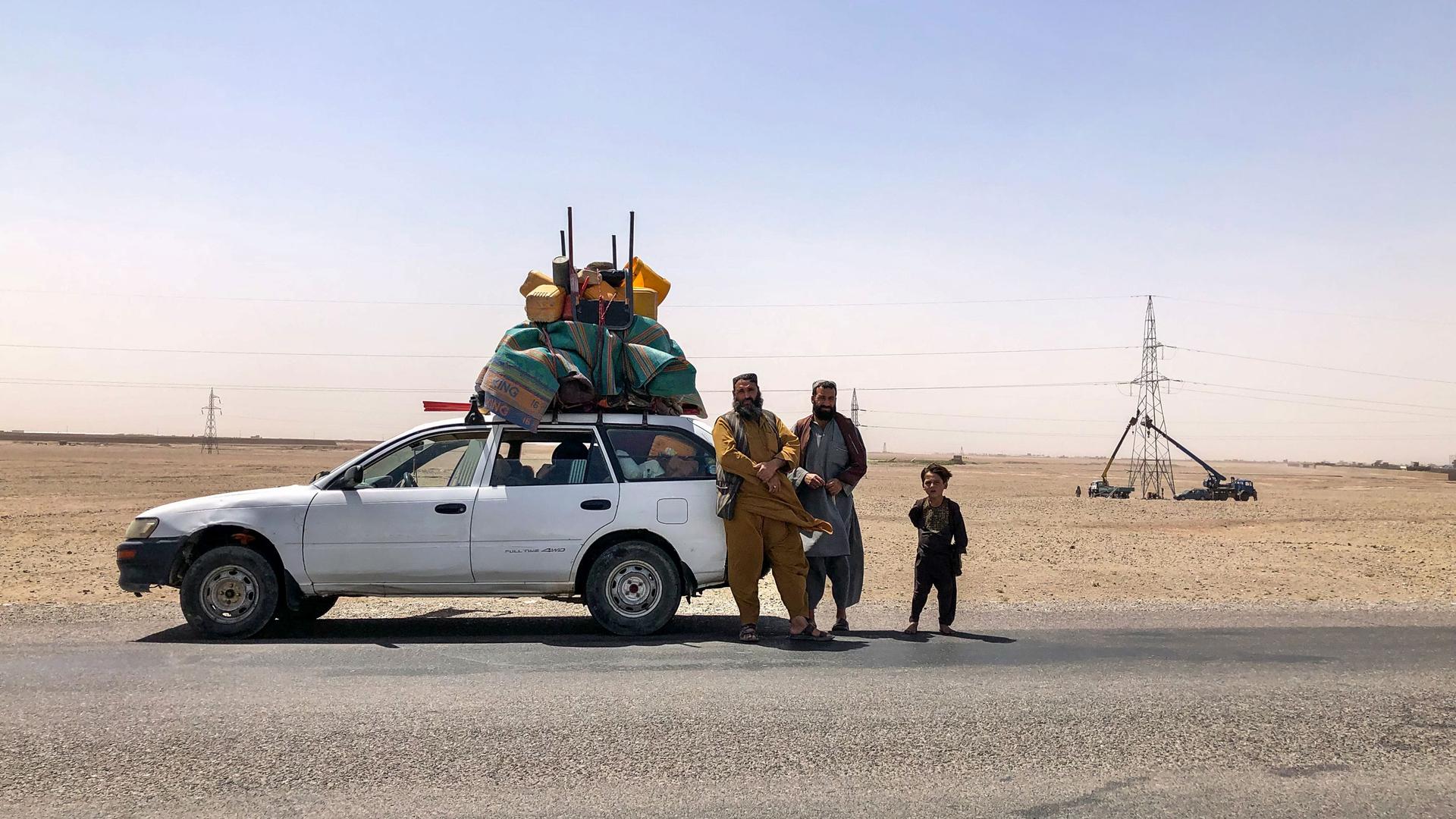Afghans in a city under siege by the Taliban: ‘The insecurity has upended our lives’
Editor’s note: The situation in Afghanistan is changing rapidly. Our reporter, Shirin Jaafari, was in Herat recently and this is her story about people in Herat from Aug. 9. The city fell to the Taliban this week. Stay tuned to The World for more updates on the developments in Afghanistan — including this interview with one woman who is trying to get her family out of the country.
Fifty-year-old Salimeh is walking home against strong winds, and the summer heat in Herat, in western Afghanistan.
She is carrying a bundle of firewood in one hand and holding her chador or head covering, in place with the other.

Related: As the Taliban advances, life in Afghanistan becomes increasingly precarious
On this day in early August, Salimeh — who, like many Afghans, only has one name — had to gather extra wood for the fire because she has guests — women and children from three families who fled fighting north of the city.
She was exhausted, and in pain, by the time she got to the mud house where she lives on the outskirts of Herat. But she is full of compassion for those who have arrived at her home. Many of her neighbors are also taking people in.
“The government hasn’t provided any support for the displaced families and those whose incomes have been impacted by the insecurity,” said Salimeh, who’s been sewing bedding and curtains but now has fewer clients because of the fighting. “The insecurity has upended our lives, and no one cares about us here.”
This month, the Taliban took hold of areas surrounding Herat, Afghanistan’s third-largest city and an important economic hub, and have gained control of six provincial capitals.
To hear more from The World’s Shirin Jaafari in Herat recently, click on the audio player below:
Since US President Joe Biden announced a full and unconditional withdrawal of troops from Afghanistan last April, a process that is now nearly complete, fighting has intensified across the country. The Taliban has been pushing to take over more territory from Afghan security forces in an attempt to rule Afghanistan by force.
Meanwhile, the UN Refugee Agency estimates that more than 270,000 Afghans have been displaced inside the country since January 2021.
Related: Rocket fire in Kabul signals deepening insecurity as US troops withdraw from Afghanistan
“Because of the ongoing violence, there has been an increased number of displaced populations in Afghanistan,” said Ram Kishan, deputy regional director for Asia for Mercy Corps.
“A total of about 3.5 million [as of December 2020] are uprooted from their homes and living in district towns and out of their homes. And they are in dire need of food, shelter, water and sanitation support.”
Fleeing the Taliban, fighting hunger
Thirty-seven-year-old Sima Fakhruddin and her neighbors left the town of Qala-e-Naw as the sun began to set. They walked for hours to reach a place where they could hire a car to bring them to Salimeh’s house.
“We had to run for our lives. We were caught in the crossfire between the Taliban, Afghan security forces and the local militias.”
“We had to run for our lives,” Fakhruddin said. “We were caught in the crossfire between the Taliban, Afghan security forces and the local militias.”
“We didn’t have time to collect our belongings, and we had to leave behind the older and disabled people.”
Fakhruddin said the Taliban came out of nowhere and they unleashed a sense of fear in the community.
“They are cruel, cruel,” she said.
Related: ‘This is the first time I am holding a gun’: Afghans take up arms to fight the Taliban
They invaded people’s homes and demanded that the women cook meals for them, she added.
They ordered poor families to slaughter sheep. And they told the women to dress modestly, threatening to pour boiling water on them if they refused.
The World has not independently verified these claims but similar reports have emerged from other parts of the country where the Taliban has taken control.
For 18-year-old Negineh, the escape was even more challenging. She had to carry her 7-month-old baby, Ibrahim, who wouldn’t stop crying.

Negineh’s husband is one of the thousands of Afghans who cross the border to Iran in search of jobs every year. He works at a chicken farm, and travels home when possible, she said — but he hasn’t seen Ibrahim yet.
Many of the others staying with Salimeh also have husbands and fathers who’ve gone to Iraq to support their families.
Negineh said she feels somewhat safer in Herat for now but now she and her baby face hunger. She said she doesn’t have enough milk for Ibrahim and he subsides on biscuits.
Food is scarce, and this year has been especially tough as many families in this area are farmers, Salimeh said. Afghanistan is facing a drought. On top of that, the fighting has disrupted the harvest, so people are struggling, she said.
With everything happening, “How am I supposed to feed my children and help these families?” Salimeh said.
No safe place
At a makeshift checkpoint in Herat in early August, Ghand Agha, a 23-year-old soldier with the Afghan security forces, inspected cars before they entered the city.
He has been stationed here for the past month, taking shifts along with his fellow soldiers.

Ghand Agha, covering his face with a black-and-white scarf, and a pair of Oakley-style sunglasses, said the Taliban was not far from the area. So, he and his men were getting ready for a fight while an excavator dug trenches into the earth behind him.
Checkpoints like these are buffers between the Taliban and the big urban areas like Herat. The militants have been taking territory surrounding major cities in Afghanistan. But they have mostly stopped short of attacking city centers. That’s in accordance with the agreement the Taliban signed with the US two years ago.
But this is now changing.
Related: Afghan amb to the US on the Taliban: ‘They are not interested in peace but power’
Only a few hours after The World spoke with Ghand Agha earlier this month, the checkpoint came under fire. Taliban fighters launched an offensive against Herat city. They attacked a bridge that connects the city to the airport.
All flights were canceled.
Herat suddenly felt like a city under siege.
An uncertain future — especially for women and girls.
The city continues to resist the Taliban, but the situation is worrisome to many residents, especially women, who say they have so much to lose if the militants take over.

Parvin, a dentistry student, said she has nightmares about the Taliban.
“I’ve heard they force single women to marry their fighters.”
“I’ve heard they force single women to marry their fighters,” she said.
The US Embassy in Kabul tweeted about the Taliban’s forcing women into marriage in cities where they’re gaining control.
“Concerning reports the Taliban entice ANDSF [Afghan National Security Forces] units to surrender with the promise they will be unharmed, and then those soldiers disappear in the night and their widows are forced to marry Taliban fighters. If true, these could constitute war crimes,” the Embassy tweeted.
Somaya Farooqi, 19, the captain of the renowned Afghan Girls Robotics Team, also known as The Afghan Dreamers, based in Herat, said the unstable situation reinforces to the Western world that the country is just about “wars, bombs and guns.”
“But we want to show that this country is also about science and technology,” she added.
The robotics team, made up of a group of girls ages 14 to 18, recently built a mechanized, hand-operated ventilator for patients with the coronavirus.
When the team made it to Washington, DC, to compete in a robotics competition, 2017, Farooqi was struck by how they could walk around freely without worrying about security.

Now, she worries about what the future holds for the team if the Taliban takes over.
“We don’t support any group over another but for us what’s important is that we be able to continue our work. Women in Afghanistan have made a lot of progress over the past two decades and this progress must be respected.”
“We don’t support any group over another but for us what’s important is that we be able to continue our work,” Farooqui said. “Women in Afghanistan have made a lot of progress over the past two decades and this progress must be respected.”
She and other members of the team are too young to know what life was like under the Taliban. The militants ruled Afghanistan in the 1990s. But the young women say they have heard plenty of stories from their mothers.
“My mom has bitter memories from the Taliban years,” said 17-year-old Elham Mansouri. “She always wanted to be a teacher but she was banned from going to school. Now, she insists that I study hard.”
And if the Taliban stops Mansouri and her friends from going to school?
“I don’t know what we would do,” said 16-year-old Diana Wahabzada, who has been with the robotics team for three years.
“We’ll fight back,” Mansouri said. “We will open underground schools if we have to. It’s our right to study and to work. We’ll fight for these things no matter what.”
